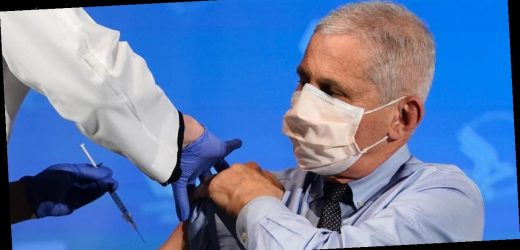- Dr. Anthony Fauci said data shows the COVID-19 vaccines may not be as effective against new coronavirus strains.
- However, both vaccines from Pfizer and Moderna have proven to be so highly effective that it creates a "cushion effect" — in that the new strains could only "somewhat" diminish its efficacy, Fauci said.
- So far, no cases of the coronavirus strain from South Africa have been reported in the US, but infections from the UK strain have emerged around the country.
- Visit Business Insider's homepage for more stories.
Top US infectious disease expert Dr. Anthony Fauci said Thursday the COVID-19 vaccines might not be as effective against new coronavirus strains, but that the vaccines were powerful enough that they would still be beneficial.
Fauci, director of the National Institute of Allergy and Infectious Diseases and an advisor on the White House coronavirus task force, relayed new data findings during a press conference at the White House Thursday.
Several new coronavirus strains have been detected in various countries — including the UK and South Africa — raising questions on how newly developed vaccines being distributed nationwide will factor into it. Fauci said both vaccines from Pfizer and Moderna have proven to be highly effective — providing a "cushion effect" in that the new strains could only "somewhat" diminish its efficacy.
"We're following very carefully the one in South Africa, which is a little bit more concerning, but nonetheless not something that we don't think we can handle," Fauci said during the press conference. The US has not yet reported any cases of the coronavirus strain from South Africa, but infections from the UK strain have emerged.
Read more: When the coronavirus runs rampant, mutations and new strains are more likely. That may be what happened in the UK.
The infectious disease expert said the emergence of new strains only further emphasizes the importance of getting vaccinated against COVID-19 and continue to build herd immunity against the virus. The spread of the new strains, which could be mutations of the coronavirus that causes COVID-19, can be suppressed if more people are immunized.
"Bottom line: We're paying very close attention to it," Fauci said. "There are alternative plans if we ever have to modify the vaccine. That's not something that is a very onerous thing, we can do that given the platforms we have."
Fauci also stressed that it's common for coronaviruses to mutate.
"Most of the mutations don't have any physiological relevance with regard to the function of the virus itself. However, every once in a while, you get mutations, either singly or clustered in combinations, which do have an impact," he said.
Dr. Rochelle Walensky, the new director for the Centers for Disease Control and Prevention appointed by President Joe Biden, echoed Fauci's sentiment on the efficacy of COVID-19 vaccines on new variants. In an interview with the JAMA Network on Tuesday, Walensky said she remains "optimistic" about the vaccines suppressing the spread of new strains.
"I'm really optimistic about how these variants are going to go," Walensky said. "I could be wrong. It could be that we'll find variants and variants may emerge … where the vaccine is less potent, but I'm still currently optimistic."
If you have a story about the coronavirus pandemic you’d like to share, email us at [email protected].
Get the latest coronavirus business & economic impact analysis from Business Insider Intelligence on how COVID-19 is affecting industries.
Source: Read Full Article


